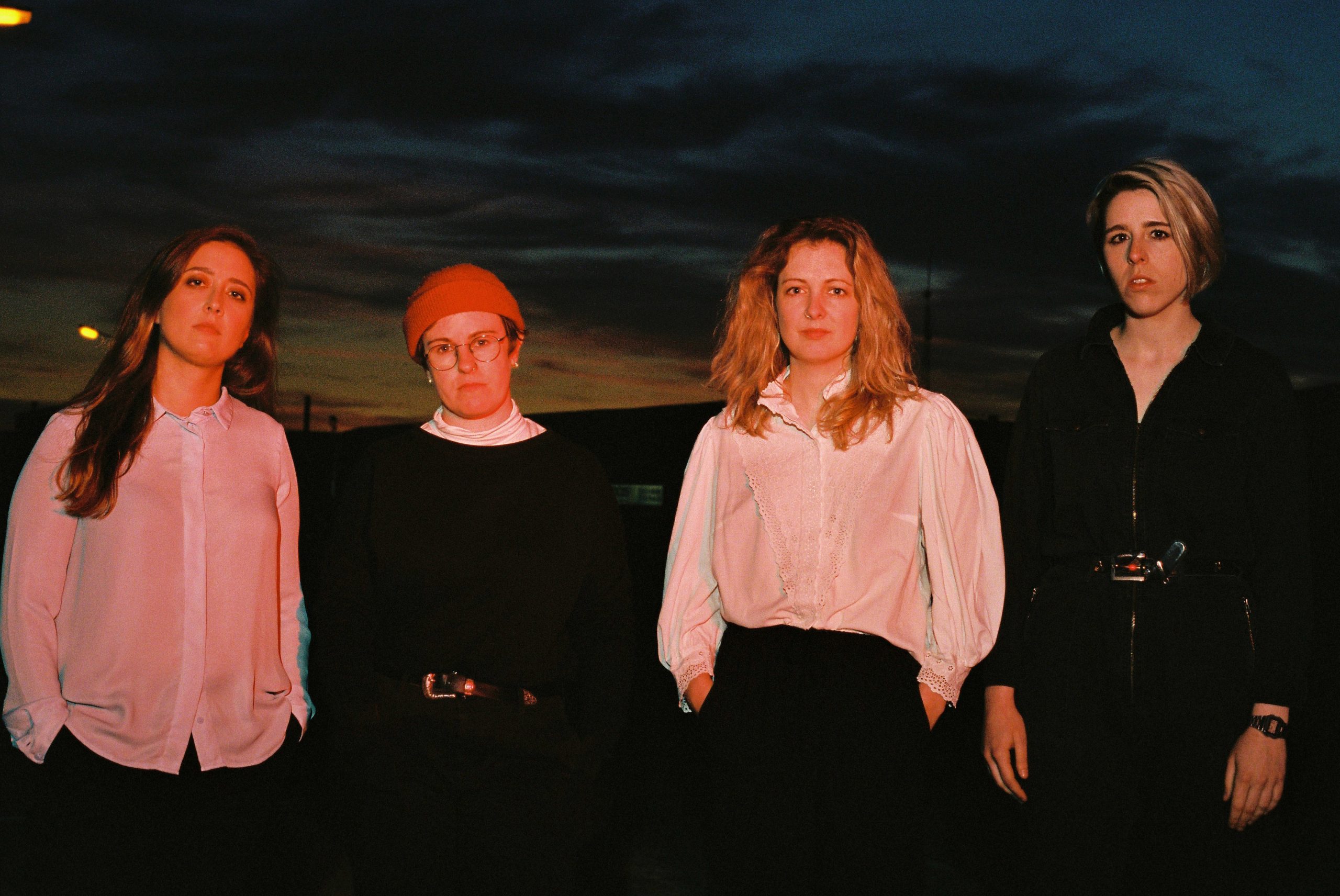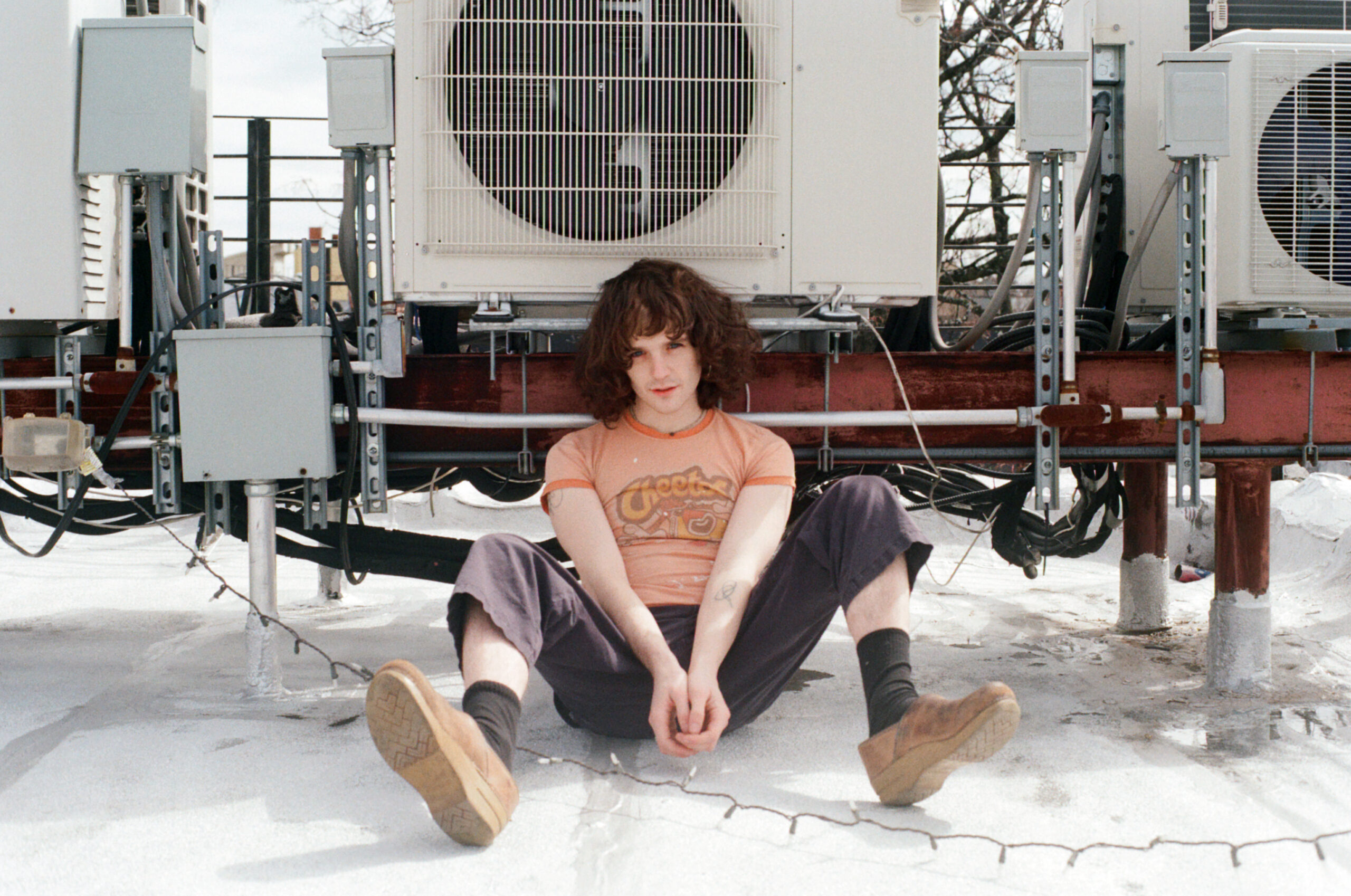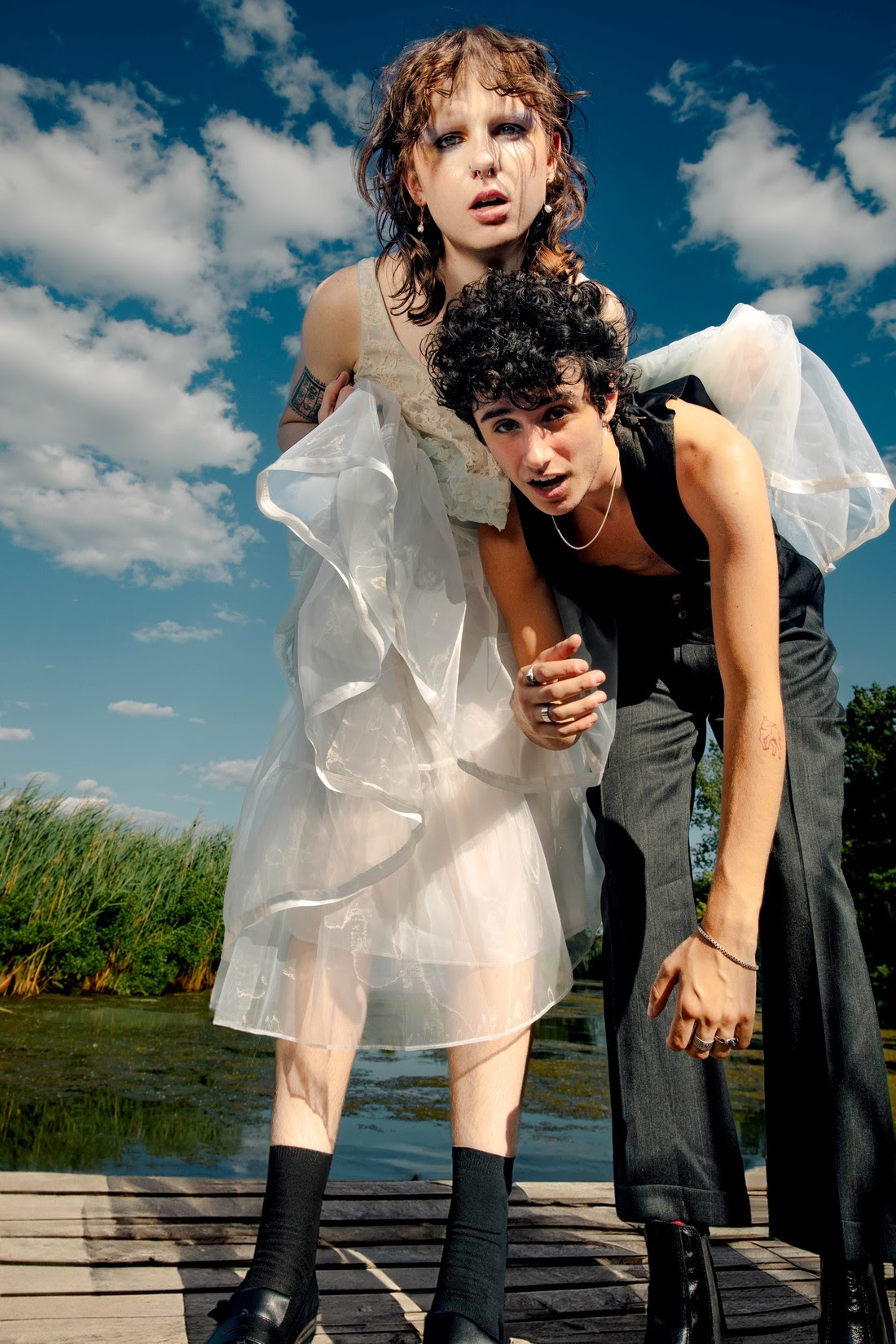Pillow Queens' origin story is as convoluted as you'd expect from a band formed by people who've been in the same scenes their whole lives. It might seem preordained that four queer Irish women who grew up within an hour of each other, worshipping Tegan And Sara and Blink-182, would become friends. But Pamela Connolly, Cathy McGuinness, Sarah Corcoran, and Rachel Lyons spent a full decade orbiting each other in and around Dublin before forming Pillow Queens, the folk-tinged pop-punk group that released its bombastic, graceful debut album, In Waiting, in September.
Now in their early 30s, lead guitarist McGuinness and singer-songwriter-bassist Connolly met first when they were 15. McGuinness, an early-blooming scenemaker who booked shows at her dad’s pub in Arklow, stumbled across Connolly's KT Tunstall-inspired singer-songwriter project on vintage social network Bebo. Unaware of the concept of catfishing circa 2005, Connolly accepted the stranger's invite to come down from her Dublin suburb of Donaghmede to play a charity gig. As queer teenagers who managed to meet each other in the mid-'00s were wont to do, they kept in touch. McGuinness met the band's future drummer, Lyons, who played in bands in her hometown of Kildare, the same way.
"We all just kept in touch through putting on shitty gigs," McGuinness tells me. "At that age, all you want is to meet other queer people and people with similar music tastes." Dressed in work-appropriate blouses, she and Corcoran, the band's co-lead singer, songwriter, and bassist, are Zooming from their lunch breaks at their day jobs in public housing and advertising, respectively. Although Pillow Queens toured Europe with SOAK last year, recently made their US TV debut on The Late Late Show With James Corden, and scored a nomination for Ireland's top music award, the Choice Music Prize, the band can't yet afford to make music full-time.
https://youtube.com/watch?v=eoBtYqTTmbI&ab_channel=TheLateLateShowwithJamesCorden
"I had always wanted to be in a band with her," Corcoran says of Connolly, admiration in her voice. They first met when Corcoran stumbled on Connolly busking in Dublin's downtown Temple Bar (she'd been kicked off a bill for being under 18). Struck by Connolly's voice -- aching, warm, with a nasal ragged edge -- Corcoran pulled out a camcorder to film her for YouTube. Corcoran sent her the video later on MySpace. Their online friendship solidified in the moshpits of Dublin's hardcore scene. A few years later, they were best friends and roommates.
But by the time the pair moved in together in their mid-20s, Connolly had more or less stopped playing music. She felt plateaued after years of pursuing bands that never got past local gigging and drained by a full-time job, something hard to come by in 2016 in Ireland, where the economy still hadn't recovered from the recession. "I was very opposed to starting a band. I'd just lost confidence," Connolly tells me over a separate Zoom call from her Dublin apartment, after getting off work at her temp job. "When you get your foot in the door of a nine to five, you’re like 'I can’t find time for it, I'm making a bit of money.' In retrospect, it wasn't nearly enough money to give up your dreams."
Corcoran says Pillow Queens is a product of Ireland's political moment in a few ways. "We grew up and went to school pre-recession, at the height of the Celtic Tiger era when Ireland was very rich. We had it drilled into us that you've got to have a career, earn big, own property," she explains. "When it hit and there were no jobs, we were like, 'What are we supposed to do now?' I think a lot of creative people said, 'Fuck it, who cares if music's not a practical career?'" Her theory is that this period -- when there was little else to do besides start a band -- is behind the much-discussed boom in Ireland's music scene, best known by its artsy post-punks like Girl Band and Fontaines D.C., who were recently nominated for a Grammy. Connolly is cautious about romanticizing the recession -- "It's not like as soon as you get on the dole people just feel creative" -- but agrees that something was gestating in Ireland that’s recently been set free. On coming up as a part of the Irish rock renaissance: "It's more exciting than anything. It shows us what’s possible," Connolly says, "Hey, we don't sound like Fontaines, but maybe people will get used to that twang. Maybe they'll be like, 'Ooh, I want to hear more of that weird Irish singing.'"
For Connolly, the era didn’t translate into freedom. It took many evenings of Corcoran banging on her door before she relented to try writing a song together. One of their first attempts became "Rats," off the band's 2016 EP Calm Girls. The first thing you’ll notice about Pillow Queens is that they’re astonishingly catchy. "If I'm not a rat/ You're not a rat/ I won't say nothin' if you touch me like that," Connolly mischievously calls (pronounced "rah" and "nuttin" in her thick accent) over thick blasts of guitar and kickdrum on the singalong-ready chorus, a key feature of many Pillow Queens songs. No one in the band will tell me what the vermin-themed line means. (I assumed it was about a secret hook-up, though the music video portrays a mock children's TV show where hosts share lessons on ACAB and not being a scab). But with their boundless enthusiasm and hooky emo-inspired riffs, Pillow Queens could get a packed bar to scream just about anything back at them.
"Rats" is charmingly scrappy. Now four years old, it's a blueprint for Pillow Queens' sound, simpler than anything on In Waiting. Connolly still had her doubts after writing it. “I thought, 'God, my songwriting has really regressed,'" she remembers. She didn't see the magic in it until the first practice with Connolly's old friends, McGuinness and Lyons, who were enlisted at a pickup basketball game (Corcoran rolls her eyes: "It's literally an episode of The L Word… If the weather was nicer in Dublin it would've been volleyball"). McGuinness, who studied music in school, is the technical one in the band. "She literally gave us worksheets," Corcoran says, grinning. McGuinness rebuts, "The girls could play. They just didn't know the names of any chords or what a harmony was." She beefed up "Rats" with bright, chugging guitars and suggested all three women harmonize behind Connolly. "There was every reason for it to sound weird and terrible. But it sounded great," Connolly recalls.
Pillow Queens' sound is fully-formed on In Waiting. There's no shortage of hooks or anthemic choruses. But the 10 tracks have a newfound gravity, depth and unique style. Although they share DNA with rowdy indie punks like Diet Cig, Camp Cope, Charly Bliss, and illuminati hotties, Pillow Queens have distinct calling cards. For one, all four Pillow Queens sing on every single track. Their sisterly harmony is occasionally out front, like on the chorus of pretty shredder "Liffey" and the end of slow-building heartbreaker "Holy Show." But even murmured at a low volume, their harmonies an odd elegance to Pillow Queens' blunt, Weezer-ish riffs. "We are just as intensely obsessed with folk music as we are with our weird emo youths," Connolly says. "We thought the harmonies would be a lovely contrast with the harsh guitars, and especially at the beginning, sloppy playing."
Something else that makes Pillow Queens sound like no other band is Connolly's literary melodrama as a songwriter, which clashes wonderfully with their DIY spirit. Hearing Connolly wail, "You'll have my head/ You'll have my head on a silver plate!" over a wall of distortion on "Liffey" feels like an inverse of ethereal folk acts who sing about therapy and scrolling Instagram. (She has modern moments too, regretting "belly achin' 'bout a fire sign" on "Gay Girls"). It might just sound folkloric to Americans, but the drama is heightened by Connolly's studies of Ireland; she describes Dublin as a "sore sad city" on "Handsome Wife" and reaches for comfort in the "embrace of the northern bay" on "Donagmede." On that track, in the indie rock tradition of romanticizing towns like Stockton, California or Omaha, Nebraska, Connolly begs a lover to "Stay for a week/ In sunny Donaghmede," her suburban hometown, best known for its shopping malls. "We were very into the Bloomington, Indiana scene when we were like 16 or 17," explains Corcoran. "Songs always mention Bloomington; we were like, 'One day, it'll be Donaghmede and Finglas.'"
The grandeur of her lyrics, Connolly says, is a result of imagery sponged up during her Catholic childhood. "It’s almost just cultural here, biblical language. References to god are just woven into language -- I mean look at Hozier's music" she says, referencing the singer whose sex ballad "Take Me To Church" became a global hit in 2014. The effect is particularly delicious on "Handsome Wife," a queer fantasy of a marital bliss, when Connolly paints scenes like, "Me and all your fathers' daughters/ Lay beside the tide to take us/ Kissed the bride and fought you favors/ I may not be the wife you want but I’m pregnant with the virgin tongue."
"I guess it's a bit of 'Hey, we're four queer women using religious references to write songs about fancying girls,'" Connolly says, explaining the band is often interpreted to be making confrontational statements they don’t intend. "But some of it is just quite beautiful. We're not only referencing religion to reject it. Catholicism was something that certainly affected myself, Sarah, and Cathy a lot when it came to accepting our queerness. It's nice to be able not to look back so disdainfully and say, 'I'm going to look back without angst and use these metaphors."
Pillow Queens are easily misread as social justice punks because all the members are queer and happy to talk about it, as opposed to artists who set firm boundaries to avoid having their identities treated as a trend. Make no mistake, the band's name is queer slang for someone who likes to get more than they give in bed. They mention the Irish anti-immigrant policy "Direct Provision" in every interview, and little girls don dirty communion dresses in their music videos. But when it comes to the music, they aren't slogan-shouters, even to the extent of something like Camp Cope's "The Opener" or Diet Cig's "Tummy Ache." Their song "Gay Girls" has been dubbed a "celebration of queer identity" as a result of the title and a few words in the chorus. But "Gay Girls" is really just about "a normal person having anxiety about someone they're interested in," Connolly says. The band gets closest to riot grrl rock when Corcoran’s writes, like on "HowDoILook," a sardonic body-angst manifesto, and "A Dog's Life," which is about Dublin's housing crisis. Part of the fun of Pillow Queens is hearing the band scream-chant, "I! Won’t! Worry! Bout! The! Gay! Girls!" But those moments feel richer and more authentic for all the subtle ones, like on "Holy Show," when Connolly sings, "I've got your eyes and cheeks in front of me/ Filling the space between my thighs." "We love watching what people like girl in red are doing, because it's just a different world. We grew up on the edge, where it was still a political statement to sing about 'she' and 'her,'" Corcoran says. "Artists like her don't even think about whether or not to do it."
Like every young band during the pandemic, Pillow Queens are in a strange spot. Despite their achievements, they had to self-release In Waiting after hearing from more than one label that they already had some all-girl bands on their roster. With touring still dangerous, leaving their jobs and breaking through in the US and Europe is a distant fantasy. Despite this, Pillow Queens are thrilled with their year. "Not to blow smoke up COVID's arse, but maybe the album would've gotten lost with more releases. Maybe Corden wouldn't have happened," says Connolly. For now, they'll take cues from their own album. Each member has a different interpretation of the title. "Pamela was excited about the play on 'ladies in waiting.' I felt like the album covers those years of limbo between youth and adulthood," says McGuinness. "But Rachel suggested it as, 'We've been in waiting for four years. People don't know who we are yet. But we're ready to explode now.'"






